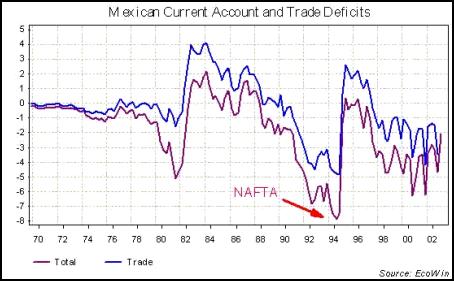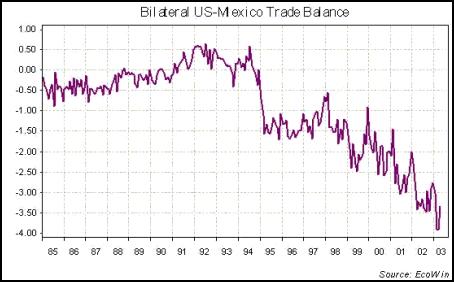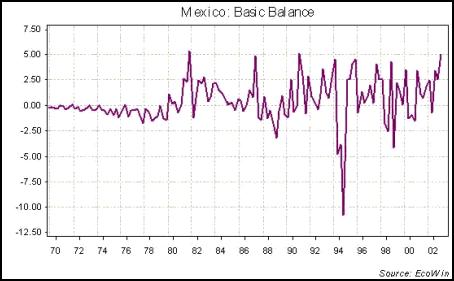SRA Commentary: Remember the Alamo
SRA Commentary: Remember the Alamo

By Chris Sanders
July 7 ,
2003
" The statement that cartels can abolish crises is a fable spread by bourgeois economists who at all costs desire to place capitalism in a favourable light. On the contrary, when monopoly appears in certain branches of industry, it increases and intensifies the anarchy inherent in capitalist production as a whole."- V.I. Lenin, Imperialism, The Highest Stage of Capitalism, New York, International Publishers, 1939, p. 28
...the fact that public opinion is the basic force which produces the phenomenon of rule in human societies is as old, and as lasting, as mankind...Even the man who attempts to rule with janissaries depends on their opinion and the opinion which the rest of society have of them...The truth is that there is no ruling with Janissaries. As Talleyrand said to Napoleon, 'You can do everything with bayonets, sire, except sit on them.'
- José Ortega y Gasset, The Revolt of the Masses, London, W.W. Norton & Co., 1932, p.127

(Not a chinaman in sight)
No jobs, no kidding
We have been saying for over a year and a half that there would be a jobless recovery in the United States, and the June American payroll numbers drove that point home forcefully. The unemployment rate jumped sharply and payroll employment slumped. Part time employment rose, a "bright spot" to many economists, and the housing market continued to support not only homebuilding, but also expansion of employment in lending institutions. None of this is productive, however, in the economic sense of the term. Where it counts, employment is dropping, continuing a twenty year trend. The country that as recently as thirty years ago was still the world's industrial powerhouse is a faint shadow of its former self
In places like the southeast of England where we live, and where employment and industry are dominated by financial services and information technology, this sort of talk does not resonate like it used to. Modern Britain fancies itself at the cutting edge of the New World Order; figuratively in economic terms, literally in the case of Afghanistan and Iraq. But Britain too, following the US lead, has made a fateful commitment to deindustrialisation. It is unlikely that most citizens of either country understand all the implications of this. But providing services is not the same as manufacturing the means of production. Nothing is more emblematic of the deracination of both countries than the silly conceit that "intellectual capital" will somehow make up for the loss of say, the machine tool industry. Any doubts I may have had about this were swept away some two years ago at a dinner with two senior British financiers who were congratulating themselves on just having sold a business to a German institution, which had paid well over the odds to make its acquisition. My British dinner companions were congratulating themselves on their acumen, and laughing at the Germans who "didn't know the first thing about value creation."
One man's value is another man's loss
Well, the "value creation" that they were referring to was of course the same value creation that one sees operating between rug merchant and tourist. On the other hand, Germany is still one of the two leading manufacturers and exporters of machine tools in the world, without which industry ceases to function in both Britain and the United States. Value creation?
Emblematic of this sort of stupidity was 'General Motors announcement of a jumbo bond issue of $13 billion, increased within days to $17 billion. Included in the debt package was more than $3 billion of debt convertible into equity. The purpose? To shore up its yawning pension liability gap that has resulted from the fall in equity markets since 2000. GM's assumed future returns on its pension fund are 9% per annum. It is funding itself around 7% per annum. Billed as "somewhat accretive" to earnings per share by GM Vice Chairman and CFO John Devine, one could hardly ask for a better example of why we are fond of saying that American industrial companies are in the business of manufacturing collateral, not cars, aircraft, or anything else useful. Instead, it has floated the largest corporate bond offering in history, and is using debt convertible into equity to prop its pension fund. Value creation indeed.

Fox Hunting in Mexico
In ironic juxtaposition to GM's "historic" bond offering, both the Financial Times and the Wall Street Journal last week carried stories on the debacle faced by Mexican industry. NAFTA has not produced the promised prosperity for Mexico, as anyone with common sense in 1994 understood. NAFTA was and is about corporate profits, which is to say management's compensation, and Mexico cannot compete with Chinese labour and government tax incentives. Both the FT and Journal articles were interesting exercises in blame attribution. If jobs are leaving Mexico now, then it must be someone's fault, and that someone is Vicente Fox, senior new world order vice president for Mexico, who has not implemented needed "reforms." Fox, of course, is an establishment guy, an ex Coca Cola executive who you would have thought had a pair of safe hands. It seems like ancient history now, but it was to Mexico that President Bush made his first international overtures. He and Fox were the new team, and Mexican-American relations were only going to get better.
How times change. Bush now has his war on terror, so who needs Mexico? Fox on the other hand, promised Bush's support for a US-Mexican deal on immigration, finds that deals are not necessarily deals. And now he finds himself being blamed for the failure of something that was going to fail anyway, because NAFTA was never going to be about helping Mexico. After a brief and sudden improvement after the trade agreement was signed and ratified in 1994, Mexico's trade balance fell back into deficit.
In contrast, Mexico's basic balance, that is its current account plus capital account balances, is in surplus. To contemporary economic taste, this is deemed to be a "good" thing, although things are not, alas, so simple. The surplus on the capital account is just another way of saying that Mexico is selling its saleable assets and running up a larger debt to foreigners. This may suit the US and the European Union well enough, but it is doubtful how much good it is going to do for most Mexicans.

Just another colony
In fairness to the gringos, bilateral trade between the US and Mexico has run in Mexico's favour ever since the NAFTA agreement was signed. Given Mexico's overall trade deficit of over $3 billion dollars, it is striking that her surplus with the US is of a similar magnitude, meaning of course that it imports nearly twice that much from the rest of the world, financed, in effect, with those capital imports. And it must not be forgotten that oil is still a major component of Mexican trade: oil exports have tripled in value since early 1999, and are now running at levels not seen since the early 1980s. A comparison with the chart of the country's trade balance reveals the unsurprising information that oil is still critical to its ability to function. It is, in short, still dependent on oil sales abroad.
This combination of dependence on cheap labour and a single commodity is not unusual, but Mexico's proximity to the United States and the exodus of Mexicans heading north to find jobs within the political borders of the United States makes it more worthy of note than most. The Latino population of California is projected to exceed 50% of the state population within two to three decades, and some estimates of illegal immigration from Mexico put it as high as a million people a year. Commonly assumed to be a benefit to the US economy, because poor immigrants do jobs that Americans do not want to do, illegal immigration is a much more complex issue. To begin with, there is the assumption that Americans do not want to do those jobs. Most illegals from Mexico are unskilled, and compete with a large pool of unskilled unskilled Americans for work. Another presumption is that this is "good" insofar as wage competition suppresses inflation; a notion given widespread attention not so long ago by Fed Chairman Greenspan. The truth is that it does not do much, as a recent study by the Center for Immigration Studies argues .
The International Gastarbeiter
Of considerably greater interest, we think, than the supposed economic benefits or otherwise of immigration are its political effects. Unlike, say Turkish guest workers in Germany, or even Algerian immigrants in France, Mexican workers in the US come from a national and ethnic background with a clear and conscious social and institutional memory of a time when a considerable proportion of the land area of the United States was Mexican. A recent Zogby Poll underscores this point forcefully; a clear majority of Mexican respondents answered that they believe that the American southwest is rightfully Mexico's, and that Mexicans should not have to apply for visas to enter the United States. Just as decisive a majority of Americans believe that illegal immigration should be stopped and is opposed to any amnesty for illegal immigrants.

Mexican nationalism is nothing new, but the contemporary form of it north of the border is. Supported by a combination of social and religious conservatism and a political radicalism informed by distrust of the Americans and poverty, the Mexican American community represents something quite different than immigrant communities in Europe.
Juxtaposed against the political fact of the decade, the War on Terror, this is interesting for all sorts of reasons. 37% of the US Marine Corps, for instance, comes from the Latino community . As the military discovered during the 60s and 70s, war can be radicalising, especially as military training and experience have a way of empowering those so radicalised. This is even more true in armies that are defeated or are otherwise demoralised , a caution unlikely to be heeded by the regime in Washington, but which is none the less important.

Juxtaposed too against the economic fact that the US unemployment rate is climbing with interest rates at 1% we might wonder just how much control the government's economic managers have over outcomes. Long rates have headed higher since the last Fed rate cut, the stock market is stalled and headed for another move down unless bonds miraculously rally, and the dollar too is supported only by the most massive currency intervention in history. This would be a volatile mix in any case, but is even more so thanks to the integration of Mexican society and the Mexican economy into the political economy of the United States. Judging from polls such as Zogby's, opinion has already been radicalised, whether it is Mexican or US Republican.
Wall Street is fond of castigating Europeans and Japanese for not opening their borders to unrestricted immigration, the implication being that immigration is a source of social and economic rejuvenation. Wall Street worries about China, where millions of peasants have been on the move for years now from the rural interior to the coastal economy in search of jobs. We have long since given up expecting the Street to show any consistency, but it is still remarkable that its analysts are so silent about the great North American migration of the late 20th and early 21st century.
The point is that the US is not immune to the problems of the early 21st century world economy and is experiencing some of those problems acutely. And for investors wondering what to do with their money, this fact, viewed through the prism of market valuation, is useful.
Buy problems that are cheap, not problems that are expensive.
© 2003-5. Sanders Research Associates. All rights reserved.


 Eugene Doyle: Writing In The Time Of Genocide
Eugene Doyle: Writing In The Time Of Genocide Gordon Campbell: On Wealth Taxes And Capital Flight
Gordon Campbell: On Wealth Taxes And Capital Flight Ian Powell: Why New Zealand Should Recognise Palestine
Ian Powell: Why New Zealand Should Recognise Palestine Binoy Kampmark: Squabbling Siblings - India, Pakistan And Operation Sindoor
Binoy Kampmark: Squabbling Siblings - India, Pakistan And Operation Sindoor Gordon Campbell: On Budget 2025
Gordon Campbell: On Budget 2025 Keith Rankin: Using Cuba 1962 To Explain Trump's Brinkmanship
Keith Rankin: Using Cuba 1962 To Explain Trump's Brinkmanship